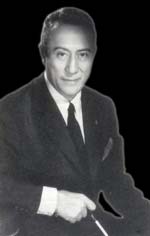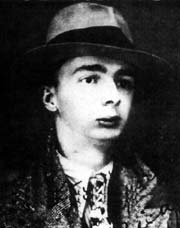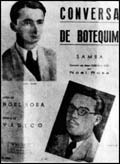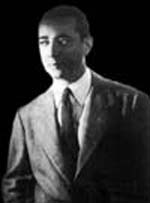By
Y qué más - “Y qué más”, an original copy

he great Enrique Cadícamo, besides being one of the most important lyricists in the history of tango, dived into the movie industry. He was director and co-scriptwriter of the film Noches cariocas, an Argentine-Brazilian co-production, shot in Rio de Janeiro in 1935 and premiered the following year in Spanish and Portuguese.
 Together with Juan Carlos Cobián, Carlos Viván, other actors and technicians, he stayed for 8 months at the then capital city of Brazil. Charlo was also part of that Argentine raid in Carioca lands. During that stay they came to know about Carlos Gardel’s death.
Together with Juan Carlos Cobián, Carlos Viván, other actors and technicians, he stayed for 8 months at the then capital city of Brazil. Charlo was also part of that Argentine raid in Carioca lands. During that stay they came to know about Carlos Gardel’s death.
That was a time of splendor in Rio de Janeiro, with an unprecedented art eruption. Theaters, radio stations and big casinos —the one at Urca, the Atlantico and the one of Copacabana— with shows of international level that attracted artists from all over the world.
Nearly two years later, on June 2, 1937 Charlo, accompanied by a guitar group, recorded his tango “Y qué más”. It was filed in the SADAIC record on July 6, 1937 with lyrics by Enrique Cadícamo. Another rendition was never recorded. It is a picturesque number with a beautiful melody.
I heard it for the first time —some time ago— on a trip by car to San Luis that I made with my father. It was on a tape that my uncle Ricardo had recorded for him. We had the impression of a very strange tango. Something in it had caused a strange sensation on us.
The piece has an uncommon cadence and a poetic structure very seldom used in the genre. But it was neither a musical nor a poetic analysis, both beyond our scope. There was something more, we had the feeling that we already knew that number, even though we were sure we had never heard that recording... no less than by Charlo!
We decided to listen to it several times, and soon we realized which was the reason of our worry. It was true, we had never heard it, but we began to recognize its lyrics and we discovered it was a straight copy of “Conversa de botequim”, samba by the great Brazilian composer Noel Rosa.
 Noel Rosa only lived for 26 years, he was born on December 11, 1910 and died on May 4, 1937 in Rio de Janeiro. But it was enough for him to step into the music history of Brazil. He was a bohemian, a frequenter of the Carioca night life, fond of good beer and women.
Noel Rosa only lived for 26 years, he was born on December 11, 1910 and died on May 4, 1937 in Rio de Janeiro. But it was enough for him to step into the music history of Brazil. He was a bohemian, a frequenter of the Carioca night life, fond of good beer and women.
He had a physical handicap, caused by a malpractice with the forceps that were necessary in his birth. His jawbone was fractured and remained sunken and with a slight facial paralysis. This handicap brought him serious problems in his life, he was always very shy and had difficulties when swallowing. Because of that he rarely used to eat at public places, he was quite embarrassed. Furthermore he had tuberculosis and his health declined soon and early.
From an early age he was in contact with music, he learnt to play mandolin at age thirteen and, later, guitar with his father, relatives and friends. When he was fifteen he played serenades in the neighborhood. In 1929, without quitting guitar and serenades, he began his studies in the school of medicine.
His show business career lasted eight years, from his debut in 1929. With a notable talent and creative capacity, he left over 250 pieces and many of them remained as classics of Brazilian music.
The strenghth of his presence in the history of Brazilian popular music is based on his compositions. He included poetic resources, images, fluency, realism, humor, existential subjects which added to his improvisational skills and his notable musical talent made him an innovator that managed to transcend his time.
He recorded over fifty records. Even though he did not possess a good voice he was regarded as a good guitarist and an excellent composer. His appearances on radio and his oeuvre were very popular.
 “Conversa de botequim” (“Café chat”) was composed in 1935. It was co-written with Vadico (a musician from São Paulo that wrote the music) and was recorded that same year by Noel Rosa for the Odeon label. Like several of his pieces it was soon spread and reached popular acclaim.
“Conversa de botequim” (“Café chat”) was composed in 1935. It was co-written with Vadico (a musician from São Paulo that wrote the music) and was recorded that same year by Noel Rosa for the Odeon label. Like several of his pieces it was soon spread and reached popular acclaim.
It turns out evident the similarity between the lyrics of “Y qué más” and “Conversa de botequim”. It is clear that Cadícamo made some changes, including scenes or porteño subjects (horse-racing, orchestras on a stagebox). About “Y qué más”, Humberto Barrella says in his work El tango después de Gardel 1935-1959, in the chapter entitled Cadícamo y Charlo nos describen un café porteño:
«It shows the idiosyncrasy of a twenty-year-old boy, without obligations, frequenter of a café with stagebox... But the café is not only his place for leisure or rest. He has regarded it as his headquarters for his relations and friends...» (page 46)
Also according to Barrella, Charlo returned to Brazil on the first half of 1937. That is to say that on his comeback he recorded “Y qué más”.
We cannot know if they heard the number in 1935 (when it was recorded and released in Brazil) or on the first half of 1937, precisely when Noel Rosa died, on May 4 of that year.
 Many years after Rosa’s death, more precisely, as from the 50s his legacy began to be reassessed, plays of his that had been unreleased were premiered and new versions of his consecrated works were made. Among the latter: “Conversa de botequim” which was recorded by Aracy de Almeida, Moreira da Silva, Chico Buarque, María Rita, Dori Caymmi, Martinho da Vila and many more.
Many years after Rosa’s death, more precisely, as from the 50s his legacy began to be reassessed, plays of his that had been unreleased were premiered and new versions of his consecrated works were made. Among the latter: “Conversa de botequim” which was recorded by Aracy de Almeida, Moreira da Silva, Chico Buarque, María Rita, Dori Caymmi, Martinho da Vila and many more.
This is the curious route of a Carioca creation. A samba, that before becoming a classic in its country, turned into a strange tango, almost without airing, by the hand of two great figures of the genre: Charlo and Enrique Cadícamo.
Translation of the lyrics of “Conversa de botequim”
Waiter, please, soon bring me
a coffe with a dash of milk but not reheated,
a loaf of hot bread with a lot of butter,
a napkin and a glass with cold water.
Shut the door at the right very carefully
’cause I don’t feel like being in the sunlight.
Ask the patron beside me
how about the soccer scores.
If you keep on wiping the table,
I won’t stand up, nor will I pay the bill.
Go ask your boss
a pen, an inkpot, an envelope and a card.
Don’t forget to bring me toothpicks
and a cigar to keep away mosquitoes.
Go and ask the man at the kiosk
to lend me a magazine, a lighter and an ashtray.
Call 34-4333 at least once,
and tell Don Osorio
that he had to send me an umbrella,
here, to our office.
Waiter, lend me some money,
’cause I gave mine to the jackpot collector.
Tell your manager
he may hang my bill on the clothes stand before us.